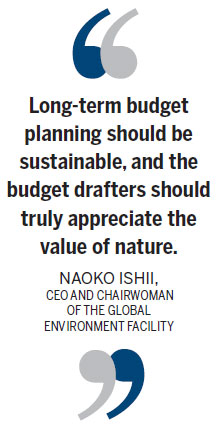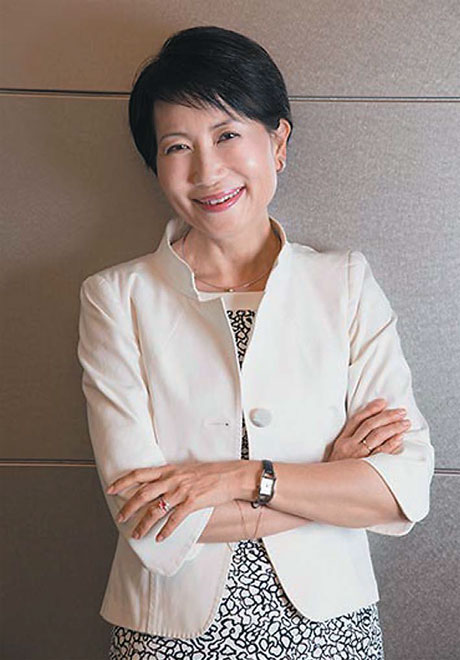In search of universal green language

Communication needed between financial and environmental sectors, head of green firm says
Economic development and climate change must go hand-in-hand if the world is to reach agreement on climate change, says Naoko Ishii, head of the world's largest source of public funding for environmental grants.
Budget planners with financial regulatory agencies need to look and think beyond economics to correctly understand the value of nature, says Ishii, chief executive officer and chairwoman of the Global Environment Facility.
| Naoko Ishii, CEO and chairwoman of the Global Environment Facility, says people should recognize the fundamental link between the environment and development. Provided to China Daily |
Climate change negotiations were started as an environmental discussion and usually they do not have much impact on nations' planning strategies, Ishii says.
"People don't speak the same language," she says, adding that strengthening communications between the financial sector and the climate and environment sector was what drove her to head a global environmental organization after she left her position as the highest-ranking female official in Japan's Ministry of Finance.
"Long-term budget planning should be sustainable, and the budget drafters should truly appreciate the value of nature."
Governments should take account of resource constraints and environmental protection in their decision-making, and people should recognize the fundamental link between the environment and development, she says.
This is a year of decisions that "will affect not only the current generation, but in particular future generations", she says.
Countries are expected to announce what are called intended nationally determined contributions in the first quarter and reach a global agreement on climate change in Paris near the end of the year.
Under a joint China-US announcement in November, the US will cut its emissions by between 26 and 28 percent from 1990 levels by 2025; China agreed to achieve the peaking of carbon emissions around 2030 and increase the share of non-fossil fuels in primary energy consumption to about 20 percent by 2030.
"Perhaps the most critical building block for the 2015 climate change agreement will be the announcement by all countries of their contributions to reduce global greenhouse gas emissions," Ishii says.
The Global Environment Facility says it is helping a number of countries in their preparations for the intended nationally determined contributions that lays out what countries intend to do to reduce emissions through mitigation action, coupled with adaptation and resilience-building.

Before Ishii joined the Global Environment Facility in 2012 she was Japan's deputy vice-minister of finance, responsible for the country's international financial and development policies and its global policies on environmental issues such as climate change and biodiversity.
The Global Environment Facility is an independent organization that works with bodies such as the World Bank, the Asian Development Bank, the United Nations Development Program and the UN Environment Program to give aid to developing countries to support environmental issues.
It has provided $13.5 billion (12 billion euros) in grants and leveraged $65 billion in co-financing for thousands of projects in developing countries since 1991.
The Asian Development Bank announced in January that it will start a three-year project this month to restore degraded land and boosting local living standards in western China through the administration of a $5.25 million grant from the Global Environment Facility.
The total project cost is $23.3 million, the balance to be provided by the government in cash and in kind as administrative support, the Asian Development Bank says.
The work will be carried out in the Inner Mongolia autonomous region and in Gansu, Qinghai and Shaanxi provinces, which were covered by the first phase of the partnership, as well as two new provinces (Guizhou and Sichuan), said Frank Radstake, an Asian Development Bank senior environment specialist.
The technical assistance project will strengthen sustainable forest management for about 442,000 hectares of land in Qinghai province, promote tree planting and introduce forestry best practices.
It will also set up 16 sustainable land management sites to demonstrate innovative approaches to forest, grassland and farmland management and promote alternative, climate-friendly living standards for communities in affected areas.
In November the World Bank approved a municipal solid waste management project that is being financed with a $12 million grant from the Global Environment Facility to China.
The project will improve the environmental performance of municipal solid waste incinerators through capacity building and by demonstrating best available techniques and environmental practices.
Cumulative Global Environment Facility financing in China had exceeded $1.22 billion by February 2013. The money has funded projects in climate change, biodiversity, organic pollutants, water and land degradation, the organization says.
The Global Environment Facility and the National Development and Reform Commission, China's top economic planner, have agreed to promote sustainable urban development and south-south cooperation in both China and worldwide in coming years.
China unveiled a south-south fund at a UN climate summit in New York in September and promised that China would double its current spending on south-south collaboration.
Xie Zhenhua, China's top climate negotiator at UN climate talks in Lima, Peru, last year, said China will develop management measures for the new fund soon and strengthen cooperation with international organizations such as the Global Environment Facility and the UN Environment Program.
Ishii emphasized China's growing role advocating the importance of south-south collaboration and knowledge sharing.
"The Chinese government is not lacking money, but it appreciates the Global Environment Facility's efforts in promoting cutting-edge technologies and new ways of doing business."
The climate finance architecture is evolving rapidly as the Green Climate Fund is established, and the robust initial capitalization of the Global Environment Facility is encouraging, she says.
Developed countries pledged to support the Green Climate Fund and mobilize $100 billion a year from public and private sources from 2020 to help developing countries to tackle carbon emissions.
However, Ishii says she does not believe that the Green Climate Fund will compete with the Global Environment Facility. The scale of the combination of the two would be a very tiny part of the public sector's money. The Global Environment Facility must remain a catalyst in the evolving architecture of environmental finance, she says.
Coming back from the World Economic Forum in Davos in January, Ishii says the link between energy, climate change and economic growth and opportunities was a central theme in the discussions among the global leaders gathered in Davos.
"In Davos we talked, for example, about how to close the energy gap in Africa, where more than 600 million people today are without modern energy. Clean energy will play a central role in closing this gap."
But the transformation to low carbon development will not come automatically, she says.
In many countries much needs to be done to strengthen policy and regulatory frameworks to create an environment that is conducive to private investment, that promotes innovation and continuous improvements in energy efficiency.
Public institutions such as the Global Environment Facility can play a critical role in helping mobilize low-carbon investment, including by providing risk-willing capital to kick-start the deployment of new technologies or to help aggregate multiple small projects into investment-size packages. The key is that the limited public finance focuses on catalyzing widespread private sector action.
lanlan@chinadaily.com.cn
(China Daily European Weekly 02/06/2015 page23)
Today's Top News
- Japan tempting fate if it interferes in the situation of Taiwan Strait
- Stable trade ties benefit China, US
- Experts advocate increasing scope of BRI to include soft power sectors
- New engine powers cargo drone expansion
- China to boost green industry cooperation
- Manufacturing PMI rises in November































